Related Research Articles

The Reconstruction era was a period in American history following the American Civil War (1861–1865); it lasted from 1865 to 1877 and marked a significant chapter in the history of civil rights in the United States. Reconstruction, as directed by Congress, abolished slavery and ended the remnants of Confederate secession in the Southern states. It proclaimed the newly freed slaves citizens with (ostensibly) the same civil rights as those of whites; these rights were nominally guaranteed by three new constitutional amendments: the 13th, 14th, and 15th, collectively known as the Reconstruction Amendments. Reconstruction also refers to the general attempt by Congress to transform the 11 former Confederate states and refers to the role of the Union states in that transformation.

Lucius Quintus Cincinnatus Lamar II was an American politician, diplomat, and jurist. A member of the Democratic Party, he represented Mississippi in both houses of Congress, served as the United States Secretary of the Interior, and was an Associate Justice of the Supreme Court of the United States. He also served as an official in the Confederate States of America.

Alexander Hamilton Stephens was an American politician who served as the vice president of the Confederate States from 1861 to 1865, and later as the 50th governor of Georgia from 1882 until his death in 1883. A member of the Democratic Party, he represented the state of Georgia in the United States House of Representatives before and after the Civil War prior to becoming governor.
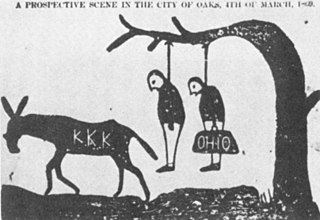
In United States history, the term scalawag referred to white Southerners who supported Reconstruction policies and efforts after the conclusion of the American Civil War.
Josiah Abigail Patterson Campbell was an American politician who served as a Deputy from Mississippi to the Provisional Congress of the Confederate States from 1861 to 1862.

Jeremiah Haralson, was a politician from Alabama who served as a state legislator and was among the first ten African-American United States Congressmen. Born into slavery in Columbus, Georgia, Haralson became self-educated while enslaved in Selma, Alabama. He was a leader among freedmen after the American Civil War.

Major-General Joseph Robert Davis was an American politician and lawyer who served as the commanding general of the Mississippi National Guard from 1888 to 1895. During the American Civil War, he served as aide-de-camp to the President of the Confederate States and commanded a brigade in the Army of Northern Virginia. He is best known for his role at Gettysburg. A member of the Democratic Party, he represented Madison and Scott counties in the Mississippi Senate from 1860 to 1861.
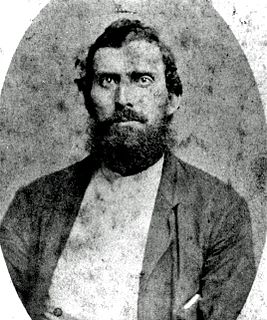
In the United States, Southern Unionists were white Southerners living in the Confederate States of America opposed to secession. Many fought for the Union during the Civil War. These people are also referred to as Southern Loyalists, Union Loyalists, or Lincoln's Loyalists. Pro-Confederates in the South derided them as "Tories". During Reconstruction, these terms were replaced by “scalawag”, which covered all Southern whites who supported the Republican Party.
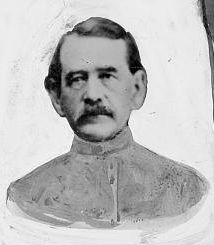
William Thompson Martin was an American lawyer and politician who became a Confederate States Army major general during the American Civil War. He later served in the Mississippi state senate, and was a delegate to four Democratic National Conventions. Martin was the president of the Natchez, Jackson, and Columbus Railroad, of which he oversaw the construction in 1884.
Judge Jeremiah Watkins Clapp was an American lawyer, planter and politician. He owned cotton plantations in Mississippi and Arkansas, and he served as a judge in the Mississippi legislature from 1856 to 1858. An advocate of the Confederate States of America, he served in the First Confederate Congress from 1862 to 1864. During the American Civil War, he was in charge of Confederate cotton in Mississippi as well as sections of Alabama and Louisiana. After the war, he moved to Memphis, Tennessee, and he served in the Mississippi State Senate from 1878 to 1880.
Abbott is an unincorporated community located in Clay County, Mississippi, United States.
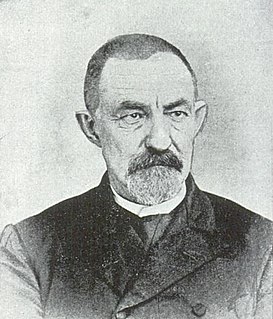
William Allen Montgomery (1829–1905) was an American lawyer, planter and Baptist minister. Trained as a lawyer in Tennessee, he was a cotton planter in Texas in the 1850s and served as a Confederate chaplain in the American Civil War. He served as the President of Carson–Newman University from 1888 to 1892.

John Sheldon Davidson (1846–1894) was an American educator, journalist, lawyer, and politician.
Salem is an extinct town in Benton County, Mississippi, United States.

Elias Alford Rowan was a longtime Mississippi state legislator from Copiah County in the late 19th and early 20th centuries.

William Henry Sims was a lawyer, Confederate officer, and Democratic politician from Mississippi. He was the state's lieutenant governor from 1878 to 1882.

Charles B. Mitchell was an American politician. He served in both houses of the Mississippi Legislature and was the Speaker of the Mississippi House of Representatives from 1888 to 1890.
Charles Alexander Martin Finley was an American emeritus secretary of the Florida Senate and state representative as well as a newspaper publisher, printer for the state of Florida, an academic administrator, and the secretary to Florida’s 15th governor Francis P. Fleming.
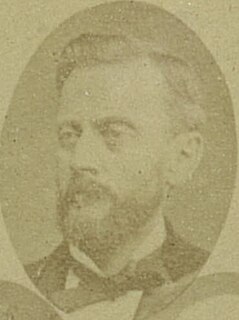
Reuben Oscar Reynolds was a lawyer and state senator in Mississippi. He represented Monroe County and Chickasaw County in the Mississippi Senate for several terms during and after the Reconstruction era ended.
References
- ↑ Southern Historical Association (1895). Memoirs of Georgia : containing historical accounts of the state's civil, military, industrial and professional interests, and personal sketches of many of its people. Southern Historical Association. p. 836. OCLC 1702523.
- ↑ Kempe, Helen Kerr (1977). The Pelican guide to old homes of Mississippi. Pelican Publishing Company. Gretna, La.: Pelican Pub. Co. pp. 5–6. ISBN 0-88289-134-0. OCLC 2799036.
- ↑ Mathisen, Erik (2018). The loyal republic : traitors, slaves, and the remaking of citizenship in Civil War America. Project MUSE. Chapel Hill. p. 138. ISBN 978-1-4696-3634-4. OCLC 1028905649.
- ↑ Ranney, Joseph A. (2019). A legal history of Mississippi : race, class, and the struggle for opportunity. Jackson. ISBN 978-1-4968-2259-8. OCLC 1076374596.
- ↑ United States. Congress Joint Select Committee on the Condition of Affairs in the Late Insurrectionary States (1872). Report of and testimony. Washington. pp. 513–544. OCLC 29619457.
- ↑ United States (1875). United States Congressional Serial Set. Washington: U.S. Government Printing Office. p. 148. OCLC 191710879.
- ↑ Senate, Mississippi Legislature (1880). "1880 Senate". Mississippi House Journal. Retrieved 2022-09-10.
- ↑ Rowland, Dunbar (1917). The Official and Statistical Register of the State of Mississippi. Department of Archives and History. p. 198.
- ↑ Memoirs of Georgia: Containing Historical Accounts of the State's Civil, Military, Industrial and Professional Interests, and Personal Sketches of Many of Its People. Southern Historical Association. 1895. pp. 835–836.